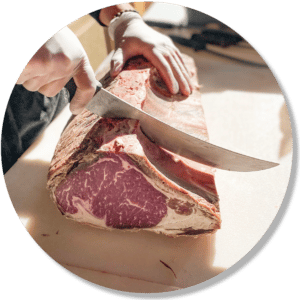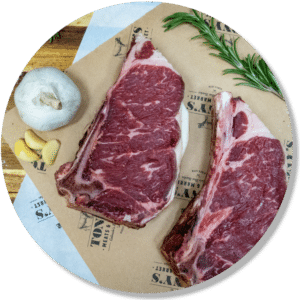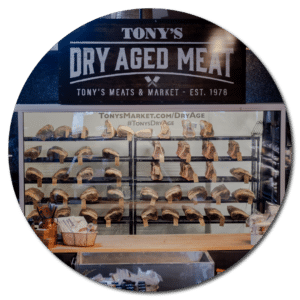Dry aging is an ancient technique that butchers and food enthusiasts have revered for centuries. It’s a meticulous old-world practice that requires patience and skill. At Tony’s we always aim to offer our customers the best culinary experience meat provides. And at the top of that list is Dry Aged Meats. Now available to reserve at Tony’s.
All of Tony’s dry aged meats are aged at our Castle Pines location in a room specially built for dry aging Tony’s quality meats. With one side of the room being a large viewing window, you can see the aging process in action, or pick out the prefect primal to age! While there, be sure to chat with one of our Butchers about any questions you may have about the dry aging process.
People have been dry aging beef for centuries. Much like one would age a fine wine or a cheese, age only enhances the natural flavors of beef and will expose you to one of the great pleasures of the food world. Like many great foods, modern technology and science have not been able to top this simple, yet perfect, way of creating a mouthwatering steak for dinner. Certain processes have become easier and more hygienic, sure, but at its roots, dry aging is the same as it’s always been – basic & delicious.
Dry aged meat comes from primals that have been left to age in carefully monitored dry conditions. When primals are dry aged, the enzymes in the meat break down the connective tissue creating a more tender, flavorful dining experience.
Why dry age? It’s simple! Dry aging allows the meats’ own internal enzymes to do their job naturally. What you’re left with is an impeccably tender and flavorful piece of meat. Dry aging increases flavor and leads to an incredible eating experience. Under a perfectly controlled environment of temperature, air-flow, rotation, time, and humidity, the connective tissues in the meat will be broken down (yes, even those tough ones!) and moisture will evaporate.
Dry aged beef will naturally taste sweeter and nuttier and will have a beautifully intense beefy flavor. The longer beef is dry aged, the more change in flavor you will experience. We feel peak balance between flavor and loss comes at dry aging beef for 28 days. That’s the Tony’s standard.
With dry aging, the absolute first step is that you must start with a quality primal. As Daniel Rosacci, CEO, always reminds us, “Garbage in, garbage out. You cannot take a poor quality piece of meat and magically make it great by aging it. You must start with quality first.” Tony’s has 20 different quality specifications that we always adhere to before products even reach our doorstep. The Rosacci family has spent over 65 years in the meat industry, has walked dozens of cattle ranches in Colorado and throughout America, visited pork farms in Iowa (and elsewhere), spent days in animal packing houses, and spent invaluable time with some of America’s top meat scientists and livestock welfare veterinarians. Only the top 12% of America’s graded beef will make the cut to become a Tony’s steak. 88% will not meet our quality standards and will be rejected by Tony’s. Then? We age it.
If dry aging meat is so great, why don’t other businesses dry age meat for customers?
Simply put, the cost. Dry aging meat reduces the weight of the primal as through the aging process, there will be external edges of meat that must be trimmed off before you can send it home with the customer. It can also be pricey to purchase whole primals and store them for weeks before they’re sold. At Tony’s, we love dry aging for our customers, regardless of the cost and effort, because we are confident that dry aging really elevates the consumer’s eating experience at the end of the day. It’s worth it to see you all smile!
 What is a primal?
What is a primal?A primal is a section of meat that is separated from the whole in a recognizable section. For example, primals are often loin, rib, chuck, round, brisket, pork butt, and ham. At Tony’s, we offer a superior selection of whole primals for our customers to choose from. All primals can be custom aged, cut, and wrapped in freezer paper for you!
Come out to our annual Butcher Days event to watch our team expertly butcher whole primals live and to your specifications!
Yes, lamb can be dry aged, but only for about a week. Being such a small muscle, your loss would be too great, leaving you with not much to eat!
We would love to age your pork loin, but only for 16-18 days and we must start with a fat-covered loin. The fat will protect the meat from shrinking too much and cause it to age into itself. It’s delicious!
As Bison has less protective fat than beef, your shrinkage and loss will be higher than with beef. This is why we recommend only dry aging bison for 12-18 days, depending on the amount of fat in your primal.
 Can I Dry Age At Home?
Can I Dry Age At Home?Essentially speaking, no, you cannot dry age at home, and here’s why.
For starters, when you dry age beef, you must dry age the whole primal to ensure that they properly age. You also can’t age an individual steak once it’s been cut from the primal. Home refrigerators do not control climate correctly and they do not give you proper air flow. While some refrigerators do exist on the market today that are capable of dry aging, they tend to be pricey and we cannot speak to their quality. Leave it to the experts at Tony’s Meats & Market and we’ll see you in a few weeks to pick up your custom-aged primal!
 Visit Our Dry Age Room!
Visit Our Dry Age Room!Check out the Dry Age Room for yourself today!
All of Tony’s dry aged meats are aged at our Castle Pines location in a room specially built for dry aging Tony’s quality meats. With one side of the room being a large viewing window, you can see the aging process in action, or pick out the prefect primal to age! While there, be sure to chat with one of our Butchers about any questions you may have about the dry aging process.
When cooking dry aged meat, you will cook it just the same as wet-aged or non-aged meat. The only difference is the final product will have a slightly different flavor (depending on the aging) and it will be much more tender.
Follow along with Chef Mick for more information
The Tony’s legacy began in 1956 when a 16 year old Tony Rosacci began his training as an old-world butcher. Tony trained in Michigan, California, and Colorado for the next 22 years under traditional Master Butchers.
Tony learned the best that each butcher could teach him about the trade, often stating, “Each butcher I learned from was better as something than the others. If I could learn each butcher’s best skill and philosophy, then bring it all together, what would that make me? The best of the best.”
In 1978, it was finally time to put Tony’s meat skills, philosophies, and hard work to the ultimate test. Tony’s Meats opened on June 22nd, 1978 on Dry Creek Road in (then) Littleton, CO. The rest is, as they say, history.
Today, Daniel and Mick Rosacci, both Master Butchers and Chefs, still lead Tony’s day to day operations.
“With today’s modern meat packing plants operating as factory assembly lines, most of the larger stores don’t even have butchers on staff. The classically trained butcher has become a thing of the past. I was almost born with a knife in my hand and I have spent the past 41 years in the daily operations of the meat industry. I am proud to have learned this age-old craft and passion from my father and great butchers from all over the world. I have had a truly blessed training.” – Daniel Rosacci, CEO, Tony’s Meats & Market